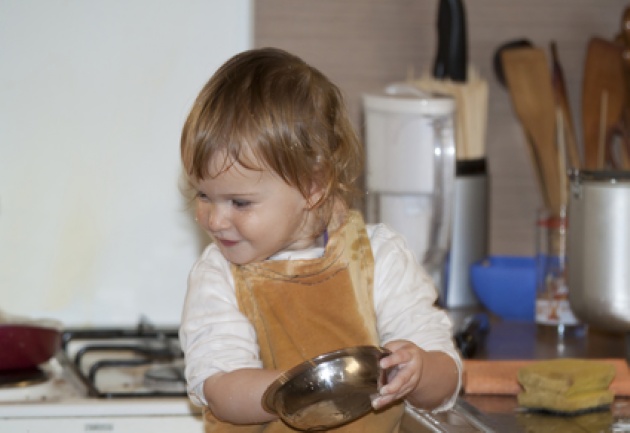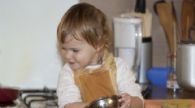Do you
know exactly what your baby will have learned from the time she is born through
to kindergarten? Do you know that your baby is smarter than you? Your baby will
have mastered how to walk, talk and eat alone. She will master the toilet, make
friends and will be able to ask questions and deduce answers.
In fact,
children between the ages of newborn to 3 learn more through daily interactions
than in any other age bracket. This research was published in The Scientist in the Crib; Minds, Brains and How Children
Learn (William Morrow, 1999). The book was co-written by Alison
Gopnik, a leading cognitive psychologist at the University of California,
Berkeley, Andrew Meltzoff, a pioneer in infant psychology at the University of
Washington, and Patricia K. Kuhl, a well-known figure on language development.
According
to the authors, one of the first things your baby will learn is to get your
attention. To do this either because he's hungry, has a soiled diaper or is
tired – your baby will cry.
"Roxanne
will scream if she hurts herself. When she's tired she'll whine. She has a
happy reaction when her mother enters the room," says Dennis, dad of
8-month-old Roxanne. "But when I get home from work, Roxanne is all ready
to play. She won't let me look at anything else; she wants me all to
herself."
In the
process of learning this, your baby is learning about human emotion. Your baby
will know how to act to make you laugh and get your approval, and will discover
things that make you mad just by observing your reaction.
"Just
by making eye contact, Justin knows if he can continue what he's doing,"
says Caroline of her 2-year-old son. "He will touch things I won't allow
him to. I know that he knows he's not to touch them. He's trying to see if I
changed my mind."
The way a
3-year-old child sees information, registers it and learns from it, she is
learning twice as fast as an adult. Ever heard the expression, "Children
soak up information like a sponge"? Many children younger than 3 are
exposed to a second language and never tell themselves they can't do it. They
learn it by seeing, doing and trying.
The best
way to enhance your baby's learning or give extra stimulation is simply by
spending more time with your child. If you are working outside the home, make
sure your child is in a high-quality child-care setting.
“The ideal
situation for toddlers and infants would be to have several attentive caring
adults and older children who play with the baby regularly in a rich physical
environment," says Gopnik.
During the
time you spend with the baby, try to play, talk, exchange and be attentive with
your child. Use all occasions as they are presented. If your baby's in the mood
to dance, then join in and dance with your baby. If she's playing peek-a-boo,
engage in a game of peek-a-boo. Be spontaneous and get down on the floor and
interact with your child. Your child will learn in situations where play isn't
present.
"I
love it when after supper Alex cuddles up with me when I'm reading my
paper," says Danny, father of 27-month-old Alex. "He pretends to read
and he can stay on my lap for a good 20 minutes. I enjoy that and I'm sure he
does, too."
They'll
learn by watching other children, or other adult caregivers in their daily
activities.
"The
kind of play we're talking about isn't a separate activity that has to be
somehow scheduled into a baby's day, but happens naturally as adults and babies
are together," Gopnik says. "That's why it's impossible to say that
'x' amount of a particular activity is necessary."
Babies are
learning when they're throwing their toys out of their beds. They're learning
when they take a bath and they're learning when they get into your pots and
pans in the cabinet. It all may seem insignificant but the baby is learning
about noise, life and the environment. She is discovering her own
possibilities.
An
important part of the research has found that babies who were deprived of the
adult interaction made children's development worse. Babies need the adult-baby
interaction. When the baby didn't get the right quality care, the baby's
knowledge suffered. Gopnik says she's worried that children aged newborn to 3
may not be getting enough quality interactions to reach the mental and
emotional levels they should normally reach when entering kindergarten.
"One-fifth
of children from birth to 3 grow up in poverty,” says Gopnik. “We provide
public support for every other kind of education and learning, but we provide
zero support for the kind of learning that happens in the first 3 years of
life.”
Gopnik,
Meltzoff, and Kuhl request the government take action by developing programs to
allow parents to spend more time with their babies such as flex or part-time
and working from home. They also demand better subsidies for parents of
children in daycare. They feel that better wages and recognition for early
childhood educators also would result in fewer turnovers in the field.
While
there are many factors that contribute to a baby's development, the authors
remind parents that the first 3 years are important – and urge everyone to pay
attention to this issue.
Side bar At Play With
Your Baby
- Interact with your baby often and in a variety of ways.
- Show interest in the things that interest your baby.
- Let your baby try and experiment with many things.
- Set up different learning opportunities for your baby. For example; pots and pans, a basket of clean laundry, empty boxes.
- Establish firm limits and be consistent with behavior you find unacceptable.
- Show your child your love and pride.

 In The Latest Issue:
In The Latest Issue:


 BY:
BY: 

Tweet
Share